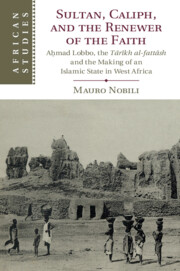 Sultan, Caliph, and the Renewer of the Faith
Sultan, Caliph, and the Renewer of the Faith Book contents
- Sultan, Caliph, and the Renewer of the Faith
- African Studies Series
- Sultan, Caliph, and the Renewer of the Faith
- Copyright page
- Dedication
- Contents
- Figures
- Maps
- Tables
- Acknowledgments
- Notes on Orthography and Other Conventions
- Introduction
- Part I A Nineteenth-Century Chronicle in Support of the Caliphate of Ḥamdallāhi: Nūḥ b. al-Ṭāhir’s Tārīkh al-fattāsh
- Part II A Contested Space of Competing Claims
- Part III The Circulation and Reception of the Tārīkh al-fattāsh, 1840s–2010s
- 6 The Tārīkh al-fattāsh at Work
- Conclusion
- Index
- African Studies Series
6 - The Tārīkh al-fattāsh at Work
from Part III - The Circulation and Reception of the Tārīkh al-fattāsh, 1840s–2010s
Published online by Cambridge University Press: 28 February 2020
- Sultan, Caliph, and the Renewer of the Faith
- African Studies Series
- Sultan, Caliph, and the Renewer of the Faith
- Copyright page
- Dedication
- Contents
- Figures
- Maps
- Tables
- Acknowledgments
- Notes on Orthography and Other Conventions
- Introduction
- Part I A Nineteenth-Century Chronicle in Support of the Caliphate of Ḥamdallāhi: Nūḥ b. al-Ṭāhir’s Tārīkh al-fattāsh
- Part II A Contested Space of Competing Claims
- Part III The Circulation and Reception of the Tārīkh al-fattāsh, 1840s–2010s
- 6 The Tārīkh al-fattāsh at Work
- Conclusion
- Index
- African Studies Series
Summary
This chapter explores how the Tārīkh al-fattāsh affected the political history of the Middle Niger in the nineteenth century and describes how the work was circulated and received. By focusing on the reception of the chronicle, the chapter pays attention to the efficient circulation of the Tārīkh al-fattāsh. Then, it focuses on the reception of the chronicle and concentrates on the debates that it generated in the Middle Niger, and beyond. It concludes by following the decline of the political relevance of the chronicle with the disappearance of the Caliphate of Ḥamdallāhi in the 1860s, and the later repurposing of the chronicle during the colonial period, when the Tārīkh al-fattāsh served another political project: that of production of knowledge for the use of French colonial administrators who aimed at better understanding the past of the colonized peoples in order to control them more effectively.
Keywords
- Type
- Chapter
- Information
- Sultan, Caliph, and the Renewer of the FaithAhmad Lobbo, the <I>Tārīkh al-fattāsh</I> and the Making of an Islamic State in West Africa, pp. 205 - 242Publisher: Cambridge University PressPrint publication year: 2020
